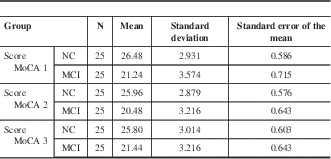

A thorough examination can also help identify any behavior or personality disorders potentially contributing to the patient’s chief complaints, as mild cognitive impairments or dementia often coexist with behavioral and personality disturbances. If the assumption is that the patient has cognitive impairment before considering other diagnoses, the patient may feel that the clinician has dismissed them due to their age, level of education, or other reasons. When performing a cognitive assessment, the clinician must take a good patient history and perform a physical exam this ensures that the patients receive a thorough evaluation while strengthening the caregiver-patient relationship. However, it can serve as a helpful resource if there are questions or concerns about a diagnosis or care.
MOCA MEANING FULL
While a full neuropsychological evaluation is the most detailed assessment, it is unnecessary for all patients who have a diagnosis or suspicion of cognitive impairment. This comprehensive evaluation can take up to a full day to complete. This exam is noninvasive and involves a battery of assessments performed by a trained professional. A full neuropsychological evaluation would ideally identify the patient’s specific deficits, differentiate between neurological and psychological etiologies, differentiate between Alzheimer’s dementia and other dementias, localize the deficits, and help formulate a personalized management plan. If a screening test is inconclusive or more information is required, a complete neuropsychological evaluation is an option.

A cognitive assessment, along with a good history, physical exam, and appropriate labs and imaging, can establish a diagnosis or decide if further evaluation is necessary. Mental status screens are short, efficient, and well-researched modalities designed to evaluate multiple cognitive domains. Most clinicians will use an established mental status screening tool such as the Mini-Mental Status Exam (MMSE) or Montreal Cognitive Assessment (MoCA) to determine if cognitive impairment is present. Available assessment tools range from those designed to evaluate a single neuropsychological domain, to mental status screens that survey multiple neuropsychological domains, to the most extensive test- a complete neuropsychological exam that assesses each neuropsychological domain. Each is carefully constructed to evaluate neuropsychological domains such as memory, language, executive function, abstract reasoning, attention, and visuospatial skills. There are many established tools used to conduct cognitive assessments. This detailed investigation of cognition can diagnose major cognitive impairment (i.e., dementia) and mild cognitive impairment, evaluate traumatic brain injuries, help determine decision-making capacity, and survey intellectual dysfunction. However, when cognitive impairment is suspected, the cognitive assessment can obtain a more detailed analysis by surveying the neuropsychological domains. Psychiatrists often perform cognitive testing during the Mental Status Exam. The cognitive assessment is useful to test for cognitive impairment-a deficiency in knowledge, thought process, or judgment.


 0 kommentar(er)
0 kommentar(er)
